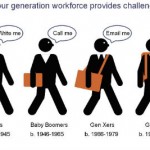 There is a lot of navel gazing in the management world about how to manage different generations. The assumed wisdom is that the different generations have markedly different needs and requirements at work, which with predictions that within a few years we will have workforces spanning five generations, represents a significant challenge to managers.
There is a lot of navel gazing in the management world about how to manage different generations. The assumed wisdom is that the different generations have markedly different needs and requirements at work, which with predictions that within a few years we will have workforces spanning five generations, represents a significant challenge to managers.
A survey published last year by Ernst & Young set out to explore perceptions of each generation. Baby-boomers, born between 1946 and the mid-1960s, are not slacking off as they age; they are seen as hard-working and productive. The middle ranks of Generation X-ers, who might be expected to be battling their way up the corporate ladder, are viewed as the best team players. Opinions on the youth of Generation Y, also known as “millennials”, are less surprising: good at tech stuff but truculent and a bit work-shy.
Are these perceptions actually true though? A study, published recently, suggests that the traditional stereotypes applied to various generations may be rather wide of the mark. It did so by looking less at what people thought, and a bit more at what they actually did.
The study explored three particularly virulent stereotypes found in the workplace:
- Baby boomers aren’t keen, or good, at jumping between jobs
- Boomers are also much more compliant than younger generations
- Gen Xers would be the least likely to work overtime
The research found that whilst there is some validity to these broad generalizations, the difference between generations is in fact quite small, and that it is therefore risky for managers to begin deploying different tactics between the generations, with the cost of doing so not generating sufficient returns to be worthwhile.
“Rather than developing HR strategies that target specific generations, organizations may be better served by designing greater flexibility into HR practices and strategies in order to address the needs and values of all employees regardless of generational cohort group.” the researchers say.
An interesting counterpoint however comes in the form of a second study looking at what different generations find enjoyable. It found that older people take more enjoyment from every day events than younger people, who are looking for more exciting and extraordinary events.
“Young people actively look to define themselves and thus find it particularly rewarding to accumulate extraordinary experiences that mark their progression through life milestones and help them build an interesting experiential CV.”
So whilst there are undoubtedly many similarities between the generations, it may nonetheless be worth exploring each employee as an individual and tailoring your management approach accordingly.
Just goes to show that your best bet is to treat people as individuals.
Amen to that.
Great article and exactly the reason we've created the Navigating Generations in the Workplace Workshop on March 3rd. It provides a great way to understand the value and benefits of working with different generations!
Thank you an interesting post. HR has seen much technological advancement in the past decade. They are much more responsible than any other post. They must be well versed in all the departments. Nothing wrong in appointing those persons with powerful post.